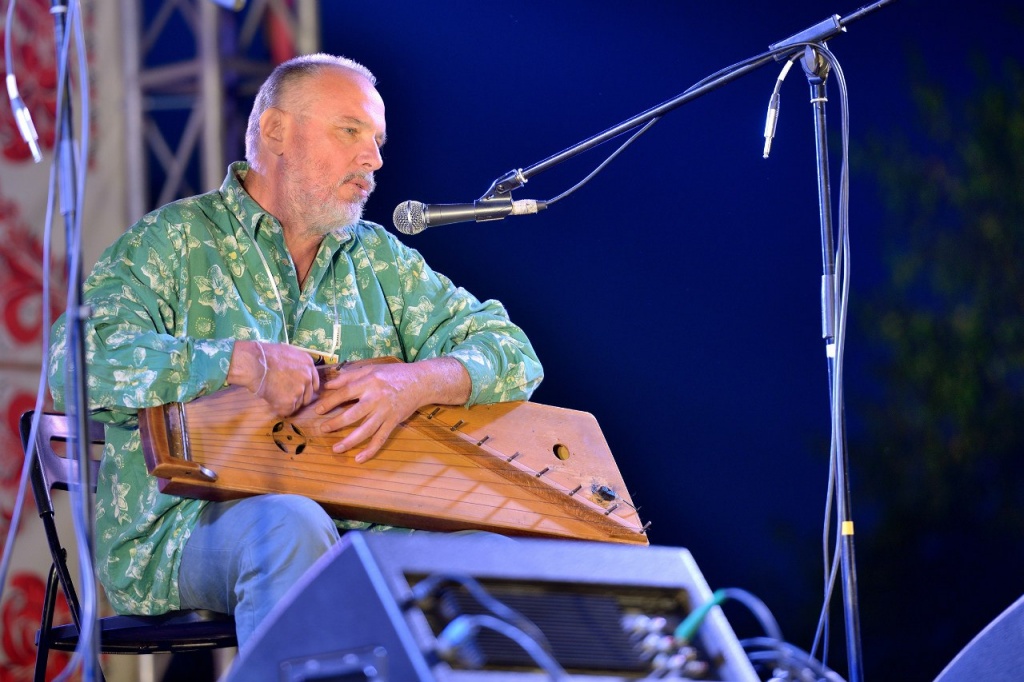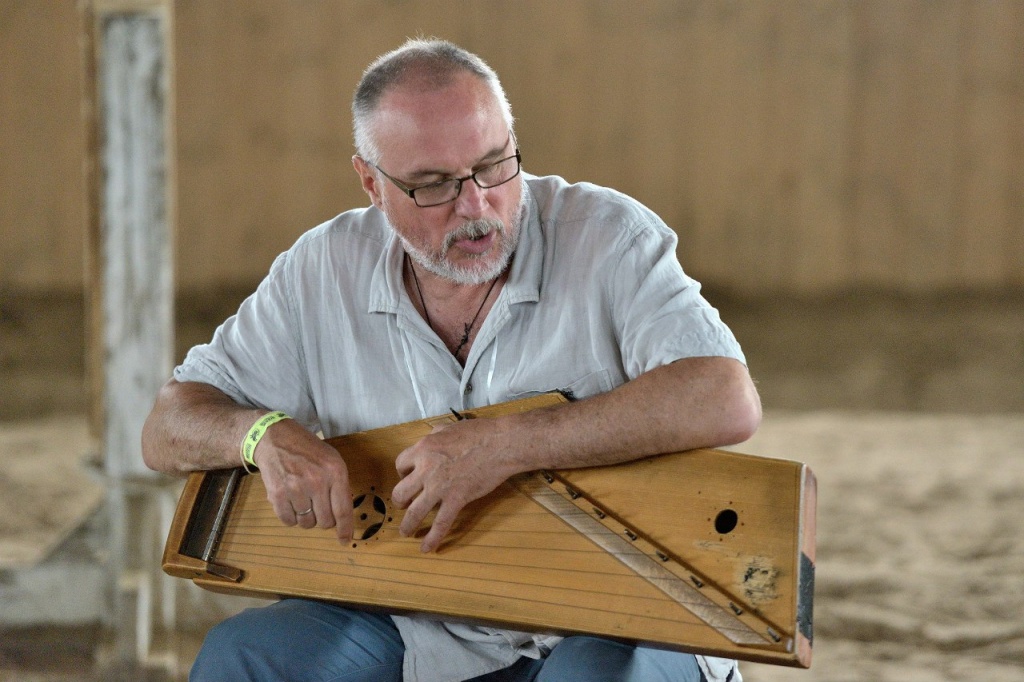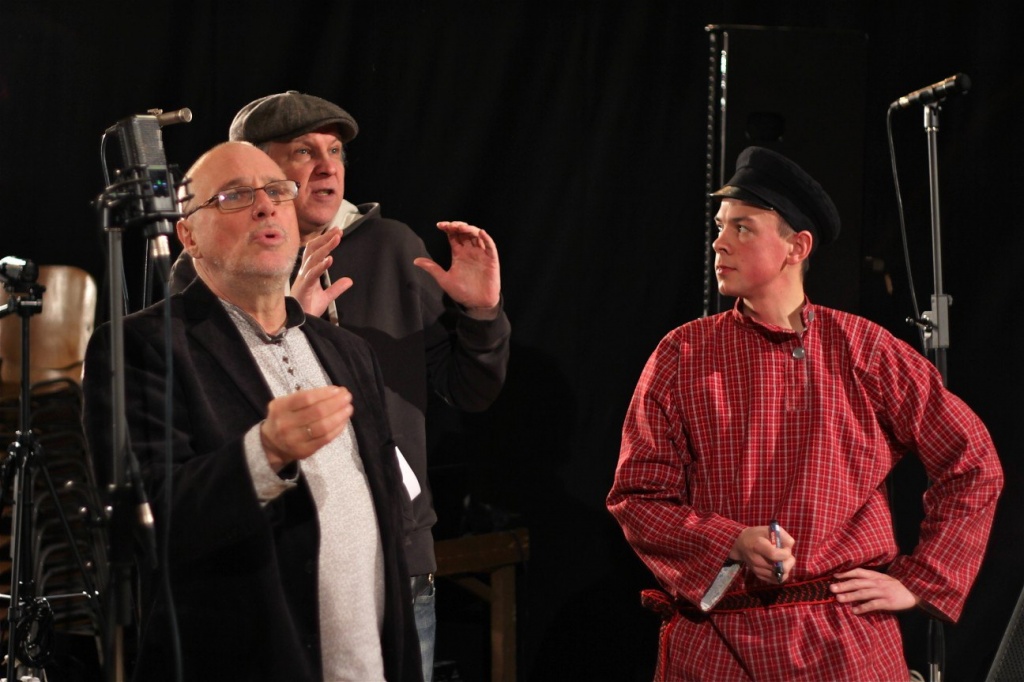
Music of the Ancestors: Clearing a Trail to Your Origins
/ Главная / Russkiy Mir Foundation / Publications / Music of the Ancestors: Clearing a Trail to Your OriginsMusic of the Ancestors: Clearing a Trail to Your Origins

Sergey Starostin. Photo courtesy of Vladislav Khramtsov
There is a group of the Moscow ethnographer's fans in the social network known as “Sergey Starostin: Maitre of Russian Folk”. It has fifteen thousand subscribers. Sergey Starostin has been collecting Russian indigenous culture in ethnographic expeditions through cities, towns, and villages for more than forty years.
The collected materials do not lie on his desk collecting dust. They are interspersed with the music of Russian rock musicians who feel honored to invite the maître for joint music-making, They are also played and sung by Sergey Starostin during concerts and performances.
The ethnographer, musician and singer was interviewed by the Russkiy Mir in the Vologda Region where he was participating in a theater festival with a performance inspired by Stepan Pisakhov's fairy tales. It seems fair to say that he came light-handed. His baggage included a kosovorotka (Russian shirt with collar fastening at the side), gusli, shepherd's horn, paired reedpipes, and whistles.

Photo courtesy of Vladislav Khramtsov
Sergey Starostin shared about his projects associated with the Year of Folk Art and spoke of whether there was any point in looking for folk art in contemporary villages, as well as the things that Russia has mostly forgotten or recalled over his lifetime. He confessed that he saw himself as a missionary telling people about the preciousness of their connection to origins.
"We used to acquire it through communication. You go to your grandmother in the village, and there it is," says Sergey Starostin. “These days, it is necessary for us to refer to archives, and ancient editions.” You can find something online, too. For example, there is a map prepared by the State Center of Russian Folklore. It features a registry of ethnographic expeditions in various regions of Russia over many decades. "Take a look, maybe you'll find your great-grandmother's voices there," suggests the maître.
“A tethered performer soon starves”
– Do you travel a lot?
– I don't keep count. There are no two years alike. Nevertheless, I do travel quite a lot as a tethered performer soon starves. A performer's life implies moving around. I certainly see touring as a chance to discover something new about the culture of the place I visit. If there is time, I take advice from my local colleagues and contacts and follow their recommendations. I have my own spots, and favorite sites to visit in many of the cities and towns where I've been to more than once.
– Can we categorize Russian cities and towns into those where heritage is preserved to a greater extent, and those where traditions are paid less attention to?
– I do not differentiate in such a way but fortunately, there are cities and towns of the first category in Russia. One of them is Vologda where we have just come to. From my point of view, Vologda can reclaim its former glory as a profoundly traditional Russian city in a Russian province with a serious historical base. However, it needs a bit of acceleration, I do not sure whether from above or below. Folk traditions are very strong across the Vologda Region.
– Are Russian traditions preserved in contemporary Moscow?
– There are plenty of things to be found in Moscow, it's the third Rome after all. There are quite a few Russian ensembles there and not only Russian ones. I think their number has increased tenfold in recent years.
– Are you preparing any special programs within the framework of the Year of Folk Art and Intangible Cultural Heritage of the Peoples of Russia?
– The big project is underway at Zaryadye Park. It will take place throughout the year. From September to February 2023, we have scheduled four concerts by musicians inspired by folk traditions.
Have we forgotten, or remembered?
– When it comes to preserving its traditions, what direction has Russia taken over the decades of your work? Put it tentatively, have we forgotten or remembered more?
Both processes are running in parallel; our population is not homogeneous. I believe that those who have come into contact with the indigenous traditional music and embraced it in some way, have believed and shaped their lives in accordance with our ancestors' commandments are happy. Yet, there are people who have been unmoved by it. So there are destructive processes and disintegration on the one hand. Nevertheless, there are a lot of creative processes on the other hand. The good news for traditions and for all of us is that there is a movement that has turned to the origins, rather than turned away. It has been gaining power and sees the third generation of those who have turned to their origins. If I represent the first generation of those who have turned to their origins, my grandchildren are growing up surrounded by traditions. At least they are in a place where they can get it.
– The records about you in encyclopedias claim that your interest in Russian folklore was sparked when you were a student on your first ethnographic expedition and heard the singing of a peasant woman from Ryazan. Was it so or do the authors oversimplify?
– Yes, that was perhaps motivation for me to change the focus of my artistic endeavors. I could have become a classical musician, played in an orchestra, and taught music. It would have been a completely different life and a different me if this encounter hadn't taken place and I hadn't turned to my origins and reshaped my life.
– Does this "conversion" you speak of involves changes in mindset and everyday life? Or is it limited to a fascination with music and folklore?
– It certainly makes changes in one's mindset, there is no doubt about that. It is hard to say whether it affects everyday life. We have abandoned the habitat of traditional culture, so these songs have a different spirit for us, becoming markers of contemporary times. I do my best to communicate this to today's public, to show that this culture is not something mothballed and obsolete. It is an art that remains absolutely relevant. The question is how to present it, and how to publicize it.
Photo courtesy of Anastasia Tasheva
The degree to which modern audiences can be reached depends only on the artist's personality. Either he is able to do it or not. My task is to awaken the understanding in people that the cultural code is the foundation for everything. Should we abandon that foundation, then culture has no potential to grow. It will be governed by some other outside processes. Culture will feature all sorts of other things rather than being ethnic. Someone gets it, and he clutches his head and begins to reflect on these questions.
Grains of folk knowledge
– When the folk culture reaches someone, does it strike them just like an encounter with something new? Or is it rather a matter of recognizing and "remembering" one's own origins?
– It can be either that or the other way around. Someone suddenly recognizes connections to his own lineage and remembers that something similar happened in his life, although he did not pay attention to it. These days, there are lots of possibilities to revive that memory. It has taken folklorists almost a century to collect a huge range of materials. And if you wish to explore them, you can pave the way there and regain that connection with your ancestors through artistic means.
– What do you think of experiments where folklore is infused into modern music, in particular electronic music?
– There are so many experiments, and my views on them vary. In some cases, I like these attempts, in other cases I really dislike them. If you use a folk song as a source, the main thing is to be truthful with it and do your best not to spoil it.
– Do ethnographic expeditions make sense today? Or is the contemporary village mostly populated by dacha dwellers?
– The generations of this knowledge holders, of course, have been significantly diminishing. Some of it has been successfully passed on. When these people grow old, they unconsciously cling in their minds and souls to the experience of their ancestors but only if they live in the countryside. They are compelled to preserve the environment where this culture originated, at least in some form. This is a very complicated process, and I cannot look at it in an unambiguous way.
Travelling is always essential because people who live in the countryside and live off the soil are wiser in some sense than us, city dwellers. We may be more twisty and cunny but they are wiser. That is why it is important to visit them, especially those places where dialectal forms are preserved as dialectal speech is like the music itself. Vologda Region is strong in terms of dialect. If you visit any village now, you will hear this music, this special dialect.

Photo courtesy of Aleksey Denisov
– You tour around the country with fairy tales by Stepan Pisakhov. He was the one who made the Arkhangelsk dialect famous. However, he is more of an inventor than an ethnographer…
– I am fine with that. I believe that a man who devoted his life to celebrating folk traditions, even if they had been processed in his mind, deserves great respect. All the more so because his language is distinctive, vibrant, and striking, picking up specific forms and phrases that are out of use but delight our ears. It seems to me that this language should be known.
New publications

 Mikhail Kalatozov, a director who transformed the world of cinematography in many ways, was born 120 years ago. He was a Soviet film official and a propagandist. Above all, he was capable of producing movies that struck viewers with their power and poetic language.
Mikhail Kalatozov, a director who transformed the world of cinematography in many ways, was born 120 years ago. He was a Soviet film official and a propagandist. Above all, he was capable of producing movies that struck viewers with their power and poetic language.  Ukrainian authorities have launched a persecution campaign against the canonical Ukrainian Orthodox Church (UOC), the biggest one in the country's modern history. Over the past year, state sanctions were imposed on clergy representatives, searches were conducted in churches, clergymen were arrested, criminal cases were initiated, the activity of the UOC was banned in various regions of the country, and monasteries and churches were seized.
Ukrainian authorities have launched a persecution campaign against the canonical Ukrainian Orthodox Church (UOC), the biggest one in the country's modern history. Over the past year, state sanctions were imposed on clergy representatives, searches were conducted in churches, clergymen were arrested, criminal cases were initiated, the activity of the UOC was banned in various regions of the country, and monasteries and churches were seized.  When Nektary Kotlyaroff, a fourth-generation Russian Australian and founder of the Russian Orthodox Choir in Sydney, first visited Russia, the first person he spoke to was a cab driver at the airport. Having heard that Nektariy's ancestors left Russia more than 100 years ago, the driver was astonished, "How come you haven't forgotten the Russian language?" Nektary Kotlyaroff repeated his answer in an interview with the Russkiy Mir. His affinity to the Orthodox Church (many of his ancestors and relatives were priests) and the traditions of a large Russian family brought from Russia helped him to preserve the Russian language.
When Nektary Kotlyaroff, a fourth-generation Russian Australian and founder of the Russian Orthodox Choir in Sydney, first visited Russia, the first person he spoke to was a cab driver at the airport. Having heard that Nektariy's ancestors left Russia more than 100 years ago, the driver was astonished, "How come you haven't forgotten the Russian language?" Nektary Kotlyaroff repeated his answer in an interview with the Russkiy Mir. His affinity to the Orthodox Church (many of his ancestors and relatives were priests) and the traditions of a large Russian family brought from Russia helped him to preserve the Russian language.

 The leaders of the Friends of the Great Russia cultural association (Amici Della Grande Russia) in Italy believe that the Western policy of abolishing Russian culture in Europe has finally failed. Furthermore, it was doomed to failure from the beginning.
The leaders of the Friends of the Great Russia cultural association (Amici Della Grande Russia) in Italy believe that the Western policy of abolishing Russian culture in Europe has finally failed. Furthermore, it was doomed to failure from the beginning.  Name of Vladimir Nemirovich-Danchenko is inscribed in the history of Russian theater along with Konstantin Stanislavski, the other founding father of the Moscow Art Theater. Nevertheless, Mr. Nemirovich-Danchenko was a renowned writer, playwright, and theater teacher even before their famous meeting in the Slavic Bazaar restaurant. Furthermore, it was Mr. Nemirovich-Danchenko who came up with the idea of establishing a new "people's" theater believing that the theater could become a "department of public education."
Name of Vladimir Nemirovich-Danchenko is inscribed in the history of Russian theater along with Konstantin Stanislavski, the other founding father of the Moscow Art Theater. Nevertheless, Mr. Nemirovich-Danchenko was a renowned writer, playwright, and theater teacher even before their famous meeting in the Slavic Bazaar restaurant. Furthermore, it was Mr. Nemirovich-Danchenko who came up with the idea of establishing a new "people's" theater believing that the theater could become a "department of public education."  "Russia is a thing of which the intellect cannot conceive..." by Fyodor Tyutchev are famous among Russians at least. December marks the 220th anniversary of the poet's birth. Yet, he never considered poetry to be his life's mission and was preoccupied with matters of a global scale. Mr.Tyutchev fought his war focusing on relations between Russia and the West, the origins of mutual misunderstanding, and the origins of Russophobia. When you read his works today, it feels as though he saw things coming in a crystal ball...
"Russia is a thing of which the intellect cannot conceive..." by Fyodor Tyutchev are famous among Russians at least. December marks the 220th anniversary of the poet's birth. Yet, he never considered poetry to be his life's mission and was preoccupied with matters of a global scale. Mr.Tyutchev fought his war focusing on relations between Russia and the West, the origins of mutual misunderstanding, and the origins of Russophobia. When you read his works today, it feels as though he saw things coming in a crystal ball...